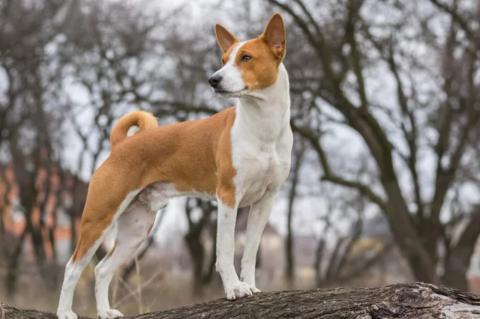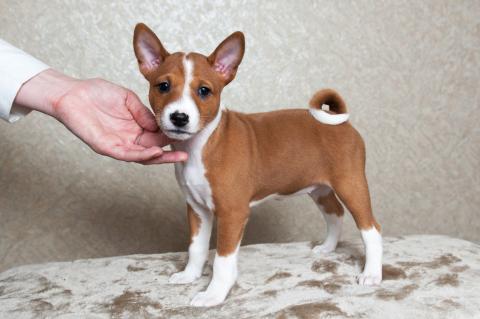
Why the Basenji is One of the Most Unique Dog Breeds in the World
Published on February 28 by Julia
The Basenji is a unique and fascinating breed, often referred to as the "barkless dog" due to its unusual vocalizations. Originating from Central Africa, this intelligent and independent breed is a favorite among dog lovers who appreciate a low-maintenance yet energetic companion. Below, we’ll explore everything you need to know about Basenjis, from their history and characteristics to their training and care needs.
1. Origins and History
The Basenji is one of the oldest dog breeds, with origins tracing back to ancient Egypt and Central Africa. These dogs were bred as hunting companions by African tribes, particularly in the Congo region. Their keen sight and scent, along with their agile bodies, made them excellent at flushing out small game. Ancient Egyptian artwork even depicts dogs resembling Basenjis, proving their long-standing presence in human history.
2. Physical Characteristics
Basenjis are small to medium-sized dogs with a sleek, muscular build. Some of their distinguishing features include:
- Size: 16–17 inches tall, weighing around 22–24 pounds
- Coat: Short, fine, and easy to maintain
- Colors: Red, black, tricolor, or brindle, often with white markings
- Tail: Curled tightly over the back
- Ears: Pointed and upright, adding to their alert expression
- Wrinkled Forehead: A signature trait that gives them an inquisitive look
One of their most unique characteristics is their inability to bark. Instead, they produce a "yodeling" sound called a barroo, which is a mix between a howl and a chortle.

3. Personality and Temperament
Basenjis are intelligent, independent, and sometimes stubborn. They form strong bonds with their owners but can be aloof with strangers. Here are some key aspects of their personality:
- Curious and Adventurous: Always eager to explore their surroundings
- Affectionate but Independent: Enjoy companionship but also like their personal space
- Energetic and Playful: Require regular mental and physical stimulation
- Strong Prey Drive: Not ideal for homes with small pets unless socialized early
Due to their intelligence, Basenjis are quick learners but may have a stubborn streak, making training a challenge for first-time dog owners.
4. Training and Socialization
Training a Basenji requires patience and consistency. Since they are highly intelligent but independent, traditional training methods may not always work. Here are some tips for training a Basenji:
- Use Positive Reinforcement: Treats and praise work better than harsh corrections
- Early Socialization is Key: Expose them to different people, pets, and environments
- Keep Training Sessions Short and Engaging: They can get bored easily
- Leash Training is Essential: Their strong prey drive makes them prone to chasing small animals
5. Exercise and Activity Needs
Basenjis are high-energy dogs that require plenty of exercise. Without proper physical and mental stimulation, they can become destructive. Activities they enjoy include:
- Daily Walks and Runs
- Interactive Toys and Puzzle Games
- Agility Training and Obedience Challenges
- Securely Fenced Yards for Safe Play
Due to their natural athleticism, Basenjis can be excellent companions for active individuals or families who enjoy outdoor activities.

6. Grooming and Care
Basenjis are one of the easiest breeds to care for in terms of grooming. Their short coat requires minimal maintenance, and they groom themselves much like a cat. Here’s what you need to know:
- Brushing: Once a week is enough to remove loose hair
- Bathing: Only when necessary, as they are naturally clean dogs
- Nail Trimming: Regular trimming to prevent overgrowth
- Dental Care: Brush their teeth to maintain oral hygiene
One major benefit of Basenjis is that they have very little doggy odor, making them an excellent choice for those sensitive to pet smells.
7. Health and Lifespan
Basenjis are generally healthy dogs, but they are prone to some genetic conditions, including:
- Fanconi Syndrome (a kidney disorder)
- Progressive Retinal Atrophy (PRA) (can lead to blindness)
- Hip Dysplasia
- Hypothyroidism
With proper care, regular vet check-ups, and a balanced diet, Basenjis can live between 12 to 16 years.

8. Is the Basenji the Right Dog for You?
Basenjis make wonderful pets for the right owner. They are best suited for:
✅ Active Individuals or Families – They need plenty of exercise and mental stimulation
✅ Experienced Dog Owners – Their independent nature can be challenging for first-time owners
✅ People Who Prefer a Clean, Low-Odor Dog – Their grooming habits are similar to cats
✅ Those Who Have a Secure Yard – Their hunting instincts make them escape artists
However, if you want a highly obedient dog or one that enjoys constant cuddling, a Basenji may not be the best fit.
The Basenji is a truly unique breed with a rich history, an independent spirit, and a playful personality. While they are not the easiest breed to train, their loyalty and quirky characteristics make them a great choice for the right owner. If you’re looking for an intelligent, energetic, and low-maintenance companion, the Basenji might be the perfect dog for you.
Would you consider adding a Basenji to your family? Let us know your thoughts!